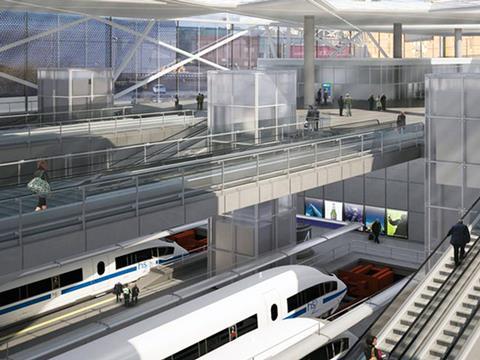
UK: Funding allocations for a number of railway projects were set out in the budget presented to parliament by Chancellor of the Exchequer George Osborne on March 16.
Following recommendations by the National Infrastructure Commission, Osborne said the government would back the High Speed 3 and Crossrail 2 schemes. It has allocated £60m for the development by 2017 of proposals for improved links between cities in northern England, including the High Speed 3 concept of improving Leeds – Manchester links to cut the journey time from 50 min to around 30 min.
The government is to provide £80m to support planning for Crossrail 2, with Transport for London asked to match this. The aim is to deposit a hybrid bill for the southwest – northeast cross-London link by the end of the current parliament in 2020, which would enable construction to start in the early 2020s for opening by 2033. The government backs the NIC’s recommendations that proposals should be developed for significantly reducing and phasing the costs, and a financing package developed whereby London would fund more than half the cost of the project.
The government is to transfer responsibility for funding London’s capital projects to TfL, giving the Mayor of London control over almost £1bn of locally-raised taxes. The government has asked TfL to put forward detailed proposals on how it could capture land value increases around publicly-funded infrastructure projects and generate revenue from its property assets; this will include consulting on reforms to compulsory purchase orders.
The government is to contribute £500m to a £1·2bn Cardiff Capital Region city deal agreed with the Welsh Government and local partners. This will support plans including electrification of the Valley Lines under the South East Wales Metro concept, with a Regional Transport Authority to be established to co-ordinate planning and investment.
An additional £5m will support the Peninsula Rail Task Force in developing options to improve the resilience of the rail line between Newton Abbot, Dawlish and Exeter, and the government ‘will fully consider the recommendations in the Peninsula Rail Task Force's final report when it is published in June.’
A further £3m will improve stations across the southwest, and £7m to improve rail stations in the southeast.
The government is to allocate £4m to support the development of High Speed 2 Growth Strategies for Manchester Piccadilly, Manchester Airport and Leeds stations, and will support a proposal for a Knowledge Quarter in the area around the future Birmingham Curzon Street HS2 station.
There is £16m to improve station facilities at Market Harborough, St Albans, Redhill, Newbury, High Wycombe, Exeter St David’s, Weston-Super-Mare, and Cheltenham Spa; the redevelopment of St Albans City station is allocated £5m. The full business case for a new Thameslink station at Brent Cross has also been approved.
The Homes & Communities Agency is to work with Network Rail and local authorities to provide land around stations for housing, commercial development and regeneration; a list of sites will be announced shortly. A memorandum of understanding has also been signed for the transfer of government and Network Rail land to Old Oak & Park Royal Development Corp.
The National Infrastructure Commission is to study options for transport on the Cambridge – Milton Keynes – Oxford corridor.

















